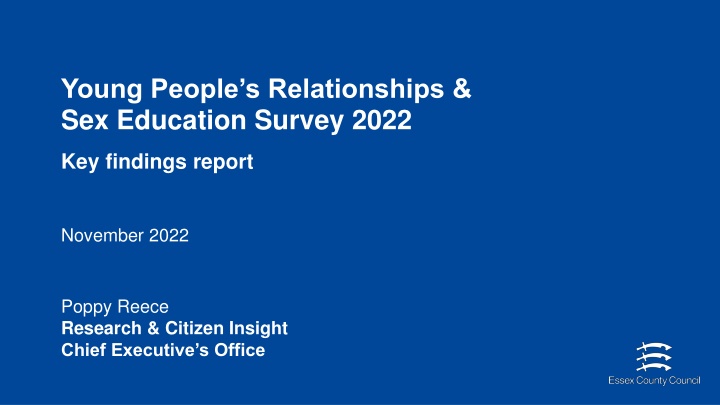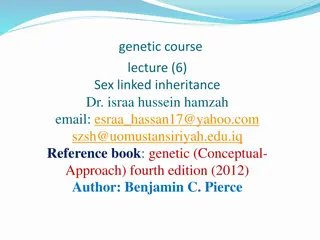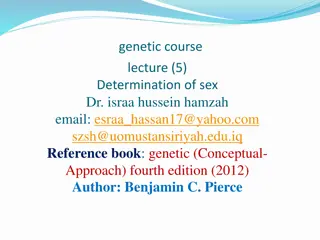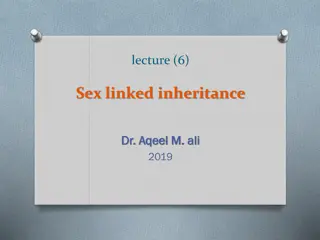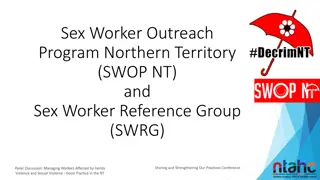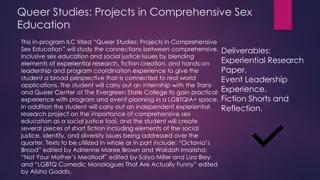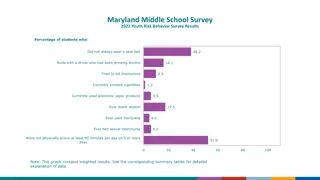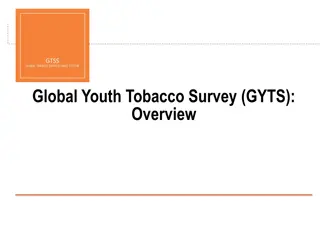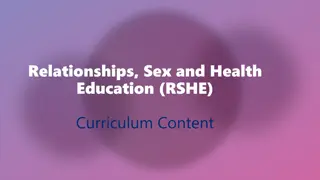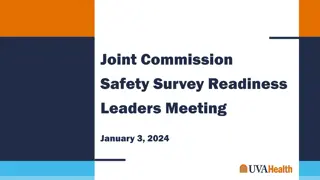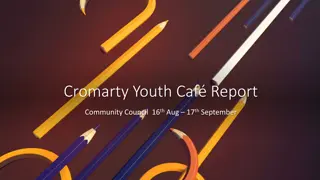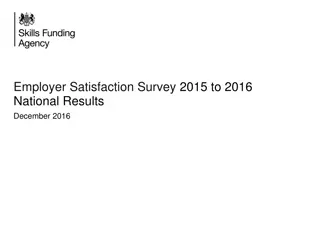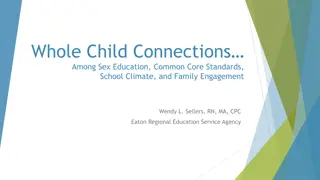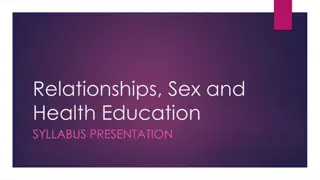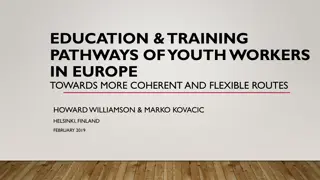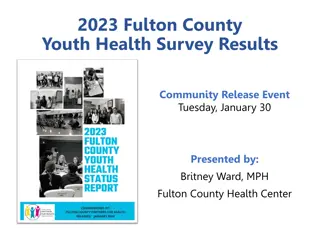Youth Relationships & Sex Education Survey 2022 Key Findings Report
The Young People's Relationships & Sex Education Survey 2022 gathered insights from 3,676 responses, focusing on the views of young individuals aged 11-25. Key findings indicate a preference for information on healthy relationships, consent, sexual health services, and online safety. The report emphasizes the importance of supporting young people in making informed choices regarding relationships and sexual health.
Download Presentation

Please find below an Image/Link to download the presentation.
The content on the website is provided AS IS for your information and personal use only. It may not be sold, licensed, or shared on other websites without obtaining consent from the author.If you encounter any issues during the download, it is possible that the publisher has removed the file from their server.
You are allowed to download the files provided on this website for personal or commercial use, subject to the condition that they are used lawfully. All files are the property of their respective owners.
The content on the website is provided AS IS for your information and personal use only. It may not be sold, licensed, or shared on other websites without obtaining consent from the author.
E N D
Presentation Transcript
Young Peoples Relationships & Sex Education Survey 2022 Key findings report November 2022 Poppy Reece Research & Citizen Insight Chief Executive s Office
The purpose of this survey, led by Essex Youth Service and Essex Public Health, was to gather the views of young people on a range of topics relating to relationships and sexual health, understanding what further information and support they would like and their preferred ways in which to access it. Background Following on from our first Relationships and Sex Education (RSE) survey in 2021 gathering the views of 16-25 year olds, this year we continued our work with young people to co-design survey questions for 11-25 year olds. Age appropriate questions were developed for young people in Years 7-9, young people in Years 10-11 and young people aged 17-25. This insight will be used to help shape and improve services so that young people feel supported to have healthy relationships. 03/10/2024 | 2 Produced by Essex County Council Chief Exec s Office
Interpreting the data within this survey This report contains several graphs that present the survey findings. Please note that where base sample sizes vary (the number of people answering a question), this is due to survey routing (different age groups were directed to different questions), or respondents choosing not to answer certain questions. Please note that some questions were select all that apply where respondents could tick more than one answer, therefore percentages do not always add up to 100%. This may also be the case due to rounding of percentages. For the analysis of free text comments, all have been read through and are presented as key themes. Statistical significance: Where graphs show differences between age cohorts or genders, please note that this may not always be statistically significant due to varying base sample sizes, and should therefore be interpreted as indicative only. Terminology: Where reference is made to gender differences between males and females, please note that this is based on respondents self-identifying as either male or female. Respondents also had the option to select non-binary or prefer to self-describe . 03/10/2024 | 3 Produced by Essex County Council Chief Exec s Office
Headline findings 3,676responses were received. Young people in Years 7-9 and Years 10-11 look to friends/family and school for information on most RSE related topics. For young people aged 17-25, a slightly higher proportion tended to look online for information or access services. 1 Young people in Years 7-9 and Years 10-11 would most like to know more about healthy and respectful relationships and consent and the law. For young people aged 17-25, they would most like to know more about steps to take after unprotected sex, and information on choices around pregnancy. 2 Around 60% of those in Years 7-9 are aware of the Essex Sexual Health Service and Essex Youth Services website, compared to just under 50% of those in Years 10-11 and those aged 17-25. This response may be skewed by significantly larger proportions of Years 7-9 completing the survey in areas where schools are more proactively promoting these services. 3 A significant proportion of young people had felt intimidated, worried or uncomfortable while on the internet, and this increases with each age group. Younger age groups were more likely to have told someone if they felt this way, and also more likely to know where to go for help, with most saying they would turn to friends/family/someone they trust. 4 Condoms are the contraceptive method which young people are most aware of how to access, with Intrauterine System (IUS) and Coil or Intrauterine Device (IUD)being the least known methods. 5 The pharmacy is where young people felt most comfortable accessing contraception, followed by shops/ supermarket. Young people felt least comfortable accessing contraception from a youth centre or School Nurse. 6 Most 17-25 year olds (64%) said they felt fairly or very confident in how to access emergency contraception, compared to 44% of those in Years 10-11. 7 03/10/2024 | 4 Produced by Essex County Council Chief Exec s Office
Who responded? 3676 responses [3676 responses] [3631 responses] 59% Year 7-9 33% Year 10-11 8% age 17-25 50% female 45% male Provider Market 2% non-binary or prefer to self-describe Remainder did not disclose District breakdown Maldon 33.1% Epping Forest 19.0% Maldon had the largest proportion of respondents (33%), followed by Epping Forest (19%) and Tendring (16%). Tendring 16.4% Basildon 8.5% Harlow 7.0% Chelmsford 3.1% Braintree 2.8% Brentwood 2.5% Colchester 2.1% Disparities across districts are likely due to increased engagement from secondary schools within these areas. Southend 1.7% Rochford 1.6% Uttlesford 1.6% Castle Point 0.4% Thurrock 0.2% 0.0% 5.0% 10.0% 15.0% 20.0% 25.0% 30.0% 35.0% [3283 responses] 03/10/2024 | 6 Produced by Essex County Council Chief Exec s Office
Where do you look for information? Years 7-9 are most likely to look to friends/family or school for information on most topics. Topics Top 3 places to look for information A significant proportion said they had not looked for information on these topics. Staying safe online and puberty were the topics they were most likely to have looked for information on, with LGBTQ+ and consent and the law being the least likely. [2164 responses] Healthy and respectful relationships Friends/family (49%) School (35%) Online/social media (12%) [32% haven t looked] Consent and the law School (38%) Friends/family (31%) Online/social media (14%) [38% haven t looked] After friends/family and school, a smaller proportion would look online/social media, and very few young people said they would turn to their GP, sexual health services, or youth workers for information on any of these topics. Staying safe online School (68%) Friends/family (46%) Online/social media (16%) [11% haven t looked] Puberty Friends / family (51%) School (47%) Online/social media (9%) [20% haven t looked] Responses under other sources include: Periods Friends/family (46%) School (33%) Online/social media (8%) Official policing or law websites Books Health app Self-taught/already knew/general knowledge School assemblies ChildLine Friends only [33% haven t looked] LGBTQ+ School (38%) Friends/family (26%) Online/social media (18%) [42% haven t looked] 03/10/2024 | 7 Produced by Essex County Council Chief Exec s Office
Where do you look for information? (Years 10-11) Young people in Years 10-11 also look to friends/family and school for information on most topics. Of the additional topics shown to this age group, a high proportion said they had not looked for information. Choices around pregnancy 46% 18% 20% 10% Where young people are looking for information, the majority are looking to schools for this for most topics, followed by friends/family. Steps to take after unprotected sex 48% 12% 20% 12% How to access contraception 46% 14% 23% 7% Methods of contraception 34% 12% 40% 7% Other answer options for this question included GP, sexual health services, youth workers, and other. HIV 39% 6% 40% 8% STIs 33% 7% 46% 8% LGBTQ+ 36% 12% 28% 19% These options received a very low proportion of responses, with all receiving under 5% (with the exception of how to access contraception where 5.2% selected GP). Menstruation 42% 26% 21% 6% Masturbation 63% 8% 8% 14% Puberty 23% 30% 34% 9% Pornography 61% 7% 12% 17% Staying safe online 25% 22% 39% 12% This graph therefore represents the top 3 answers across all topic areas only. Consent and the law 26% 18% 36% 17% Healthy and respectful relationships 30% 42% 15% 10% Full data tables are available on request. 0% 10% 20% 30% 40% 50% 60% 70% 80% 90% 100% [1222 responses] Haven't looked Friends/Family School Online/Social Media 03/10/2024 | 8 Produced by Essex County Council Chief Exec s Office
Where do you look for information? (Age 17-25) As with the younger age groups, most 17-25 year olds also look to school or friends/family for information on most topics, however a higher proportion of this age group look to online sources. [279 responses] [279 responses] HIV 34% 4% 38% 18% Choices around pregnancy 35% 18% 19% 4% 4% 19% STIs 23% 5% 45% 18% LGBTQ+ 34% 14% 19% 29% Steps to take after unprotected sex 32% 10% 21% 5% 5% 25% Menstruation 31% 26% 20% 17% Masturbation 51% 8% 9% 26% How to access contraception 22% 15% 24% 11% 6% 17% Puberty 25% 20% 35% 14% Methods of contraception 15% 9% 41% 8% 6% 18% Pornography 51% 5% 6% 31% Staying safe online 32% 14% 30% 19% 0% 10% 20% 30% 40% 50% 60% 70% 80% 90% 100% Haven't looked GP Friends/Family Sexual Health Services School Online/Social Media Consent and the law 23% 17% 31% 24% Healthy and respectful relationships 30% 39% 9% 16% While very few respondents selected GP or sexual health service for most topics, topics relating to contraception and pregnancy received a slightly more significant proportion of responses, albeit still fairly low compared to other sources of information. 0% 20% 40% 60% 80% 100% Haven't looked Friends/Family School Online/Social Media Other answer options for this question included GP, sexual health services, youth workers, and other. This represents a lower proportion selecting GP/other services for these types of topics compared to last year s survey, where between 10-14% selected sexual health services . In 2021, 23% also selected GP for how to access contraception . As with the other age groups, these options again all received under 5% for the topics listed above. This graph therefore represents the top 3 answers across these topic areas only. Full data tables available on request. 03/10/2024 | 9 Produced by Essex County Council Chief Exec s Office
Which topics would you like to know more about? Young people in both Years 7-9 and 10-11 would most like to know moreabout healthy and respectful relationships. [1231 responses] Years 10-11 and aged 17-25: 35% Healthy and respectful relationships 44% Those in Year 10+ were asked about a wider range of topics. There are similarities in responses of those in Years 10-11 and those aged 17-25, however those in the oldest age group were much more likely to want to know more about contraception and how to access it, information on choices around pregnancy, and steps to take after unprotected sex. 32% Consent and the Law 35% 44% Steps to take after unprotected sex 34% 40% Information on choices around pregnancy 28% 31% Pornography 26% Responses for those aged 17-25 are also very closely aligned with responses from last year s (2021) survey for young people aged 16-25. 26% Masturbation 26% 36% How to access contraception 24% 24% Sexually Transmitted Infections (STI's) 22% Years 7-9: [1941 responses] 20% LGBTQ+ 21% Healthy and respectful relationships 26% 46% Methods of Contraception 19% Consent and the Law 19% 39% Staying Safe on line e.g dating 19% Staying Safe on line 13% 30% Puberty 18% Puberty 20% 28% Menstruation 18% 18% LGBTQ+ 23% HIV 17% 17-25 Year 10-11 0% 10% 20% 30% 40% 50% 0% 5% 10% 15% 20% 25% 30% 35% 40% 45% 50% [N.B. respondents could tick as many options as they liked] 03/10/2024 | 10 Produced by Essex County Council Chief Exec s Office
Which topics would you like to know more about? Other comments for this question included: The way that sex is taught about in school is very heteronormative, I think it should be more inclusive to queer people. I also think we should be taught about disabilities and neurodiversity, which is important to me as a neurodiverse person who lives in a disabled household. More sex education in general and what s involved in sex LGBTQ+ sex and relationships education Cultures around relationships and healthy relationships Mental health Body confidence Teaching BOTH genders about sexual assault/ harassment/abuse and what to do if it happens Periods Pressure around having sex Contraception and safe sex Abortion awareness Toxic masculinity Actual hygiene and safety precautions for LGBT people as most resort to online and get misinformed. Staying safe in public, on the streets especially as a girl it's scary. The emotional side of sex, rather than just the science of it. I feel topics such as mental health in relation to sexual identity or gender should be looked at, as well as homophobia, sexism and mental abuse . Allow asexuals who don't feel comfortable with discussing sex- related content to just chill somewhere outside the class. Body confidence and how each persons genitals look different but are normal. I think boys should know more about periods. Periods for girls because most of it isn t taught they just tell you what it is, not what to do, so when most girls get theirs they have no idea what to do and have to rely on themselves if they don t have anyone who can help them. 03/10/2024 | 11 Produced by Essex County Council Chief Exec s Office
Which of the following sexual health information and services are you already aware of? A higher proportion of Years 7-9 were aware of the Essex Youth Service and Sexual Health Service website compared to older age groups (this may be due to a larger sample size for this age group and more proactive promotion within particular schools). Year 10+ were asked about a wider range of services. 17-25 year olds were significantly more likely to be aware of the eC-Card & STI testing services compared to Years 10-11s. [1073 provided a response] Years 10-11 and age 17-25: [843 provided a response] Years 7-9: 32% Online STI testing services Essex Youth Services website 62% 18% 49% Essex Youth Services website 49% Essex Sexual Health Service 59% 29% eC-Card 12% 46% 57% 58% 59% 60% 61% 62% 63% Essex Sexual Health Service 49% 12% For 17-25 year olds, awareness across all services has increased compared to last year s survey, where awareness was as follows: Brook website 11% 0% 10% 20% 30% 40% 50% 60% Essex Sexual Health Service: 32% Brook website: 5% Online STI testing: 15% Essex Youth Service website: 26% eC-Card: 20% Age 17-25 Year 10-11 03/10/2024 | 12 Produced by Essex County Council Chief Exec s Office
Being online and technology use
When being on the internet or social media have you ever felt intimidated/uncomfortable/worried? Whilst many young people responding said they had never felt worried, uncomfortable or intimidated while on the internet, a significant proportion had felt worried or uncomfortable, and this increases with each age group. Younger age groups were more likely to have told someone if they felt this way, and also more likely to know where to go for help. Did you know where to go for help? When being on the internet have you ever felt If you have did you tell anyone? 45% 70% 56% 40% 63% None of the above 59% 40% 63% 60% 35% 53% 35% 33% 50% 30% 30% 28% Worried 19% 25% 21% 39% 40% 25% 21% 40% 20% 30% Uncomfortable 32% 22% 15% 18% 20% 10% 13% 19% 10% Intimidated 14% 10% 5% 10% 0% 0% 0% 10% 20% 30% 40% 50% 60% 70% Year 7-9 Year 10-11 17-25 Year 7-9 Year 10-11 17-25 17-25 Year 10-11 Year 7-9 [3441 responses] [3616 responses] [3468 responses] Yes No Yes No 03/10/2024 | 14 Produced by Essex County Council Chief Exec s Office
If you have felt intimidated, uncomfortable, worried [3479 responses] Would you go to any of the following? Would you tell an adult if you were asked to do something online that you were uncomfortable with? (E.g. sending private pictures or joining an online private chat). 12% Police 13% 15% 80% 71% 5% Youth Worker 6% 70% 6% 60% 10% 52% Teacher 14% 27% 50% 41% 60% 37% 40% Friends 69% 59% 28% 30% 46% 21% 21% Family 67% 20% 17% 85% 13% 0% 10% 20% 30% 40% 50% 60% 70% 80% 90% 10% 17-25 Year 10-11 Year 7-9 0% All age groups are most likely to turn to family or friends, with Years 7-9 much more likely to go to family. A smaller proportion would go to a teacher, youth worker or the police. Year 7-9 Year 10-11 17-25 Yes No Not sure Years 7-9 were much more likely to say they would tell an adult compared to older age groups, with the proportion who say they would tell an adult falling with each increasing age group. 17-25 year olds were additionally asked whether they would tell a work friend/colleague or someone they trust. 51% say they would tell someone they trust, and 7% would tell a work friend/colleague. [3618 responses] 03/10/2024 | 15 Produced by Essex County Council Chief Exec s Office
Reasons for not telling an adult if you were asked to do something online that you were uncomfortable with Embarrassment was the main reason for not telling an adult across all age groups. If no, what would be the reasons for not telling an adult? Respondents were asked if there was something else that might stop them from telling an adult. Comments from Year 7-11 included: 100% 88% It s not a big deal/I would just deal with it/ignore/block them I just wouldn t do what they were asking (e.g. sending photos) It s private/none of their business I would feel uncomfortable/scared/anxious Parents don t understand the internet or wouldn t get it or know what to do anyway Parents would make a big fuss/involve others (e.g. Police) Wouldn t want parents to worry It depends on the situation/how serious it is 90% 78% 80% 72% 70% 60% 50% 44% 38% 35% 40% 33% 28% 30% 20% 10% 0% 0% Year 7-9 Year 10-11 17-25 Comments for 17-25 year olds had similar themes, with most saying things such as I am an adult , I can deal with it myself , it s none of their business , and I know how to handle it . Too embarrassed I would get into trouble My internet would be taken away The main reason for not telling an adult across all age groups was embarrassment, which increased with each age group. Getting into trouble was the second reason, which decreased with each age group. (N.B. 17-25 year olds were not asked about internet being taken away). Unless I was really worried I don t think there s any need to tell an adult unless I want them to do something about it as I already know to block them etc if I don t wanna see or hear anything. I feel as though I am capable of dealing with it myself, just blocking and moving on. [833 responses only answered by those who selected no to previous question] 03/10/2024 | 16 Produced by Essex County Council Chief Exec s Office
Technology use - which of the following do you have? Almost all young people have a mobile phone with internet access. The vast majority of young people also have Snapchat and TikTok, with most Year 10+ also using Instagram. Use of online gaming decreases as age increases. 98% 98% 98% [3661 responses] 100% 91% 87% 85% 85% 90% 83% 80% 75% 80% 74% 72% 67% 70% 57% 60% 54% 50% 43% 42% 40% 30% 24% 20% 10% 0% Mobile phone Snapchat Instagram TikTok Twitch Online gaming Year 7-9 Year 10-11 17-25 When asked what else young people use, comments from many respondents suggested the following are popular: Discord (instant messaging social media platform) Reddit (news and discussion platform) Roblox (online gaming platform with chat features) BeReal (photo sharing app which encourages posting daily unfiltered photos) YouTube Twitter WhatsApp Facebook 03/10/2024 | 17 Produced by Essex County Council Chief Exec s Office
Contraception and how to access it (Year 10+ only)
Do you know how to access the following contraceptive methods? (Years 10-11) Condoms are the contraceptive method which young people in Years 10-11 are most aware of how to access, with IUS and IUDs being the least known methods. Years 10-11: [562 responses female respondents only] This graphs presents responses for female respondents only, as the focus is on awareness of how to access and most methods are only relevant for females. Intrauterine system (IUS) 25% 50% 2% 23% Coil or intrauterine device (IUD) 38% 42% 2% 17% Proportions of males and females knowing how to access condoms was broadly similar (females 69% and males 71%). Hormonal contraceptive injection 38% 41% 3% 18% For other methods, the majority of males said they didn t know how to access or not applicable. 36% of males knew how to access the pill, and awareness for other methods was between 10-14%. Hormonal contraceptive implant 40% 40% 2% 18% Contraceptive pill 65% 19% 3% 12% Condoms 69% 12% 1% 18% For females, awareness for methods other than condoms and the pill is relatively low, with 40% and under knowing how to access other methods. A small proportion said they had difficulty accessing contraception. 0% 10% 20% 30% 40% 50% 60% 70% 80% 90% 100% I know how to access this I don t know how to access this I've had difficulty assessing this Not applicable Many young people my age don t feel comfortable or know if they are allowed to get/buy condoms and where to buy them, so they practice unprotected sex. I don't know any of those last ones. I tried to get contraception but I couldn't get it as I can't drive or get there. 03/10/2024 | 19 Produced by Essex County Council Chief Exec s Office
Do you know how to access the following contraceptive methods? (Age 17-25) The same trends can be seen for 17-25 year olds, however with larger proportions knowing how to access all methods. Age 17-25: [124 responses female respondents only] This graphs again presents responses for female respondents only. Proportions of males and females knowing how to access condoms was broadly similar (females 86% and males 85%). For other methods, the majority of males said they didn t know how to access or not applicable. Intrauterine system (IUS) 47% 29% 2% 22% Coil or intrauterine device (IUD) 57% 24% 1% 19% Awareness among females aged 17-25 is higher than those in years 10-11 for all methods, however awareness of methods other than condoms and the pill is still significantly lower in comparison. Hormonal contraceptive injection 57% 25% 1% 17% Hormonal contraceptive implant 60% 22% 2% 16% Compared to last year s survey in 2021, these figures show a slight decrease in awareness among 17-25 year olds of how to access most methods other than condoms (between 2-5% decrease), with a 7% drop in awareness of how to access the pill. Contraceptive pill 80% 10% 5% 6% Condoms 86% 4% 1% 9% 0% 10% 20% 30% 40% 50% 60% 70% 80% 90% 100% Increase availability in sexual health centres to be able to have consultation on different options and which one would be best for me. I know how to access this I've had difficulty assessing this I don t know how to access this Not applicable 03/10/2024 | 20 Produced by Essex County Council Chief Exec s Office
Where would you feel most comfortable going to access contraception? Young people generally feel most comfortable going to the pharmacy to access contraception, however there are some significant gender differences and variation across age groups. 46% 39% Pharmacy 43% 42% 33% 56% GP 17% 16% 31% Females aged 17-25 are much more likely to feel comfortable going to their GP (this may be due to some methods only being available there). 28% Shop / Supermarket 34% 49% 25% 24% Online 29% 35% Males aged 17-25 are also much more likely to feel comfortable accessing contraception from a shop or online compared to other groups. 15% 12% Local Sexual Health Clinic 13% 12% 6% 2% Other - Please specify Males are also more likely to say they would go to the school nurse compared to females, however school nurse and youth centre ranks fairly low for all age groups/genders overall. 7% 7% 6% 5% Youth Centre 5% 7% 5% 5% eC-Card App Those who said they would access from their local sexual health clinic is broadly similar across all groups, though slightly higher among Year 10-11 females. 9% 13% 5% 2% School Nurse 7% 8% 0% 10% 20% 30% 40% 50% 60% [1360 responses] Year 10-11 females 17-25 females Year 10-11 males 17-25 males
How confident do you feel that you would know how to access emergency contraception after unprotected sex? Most 17-25 year olds (64%) said they felt fairly or very confident in how to access emergency contraception, compared to 44% of those in Years 10-11. 35% of Years 10-11s were not sure, compared to 22% of 17-25s. Males were slightly less likely than females to say they were fairly or very confident in knowing how to access emergency contraception (43% male / 46% female among Years 10-11, and 60% male / 66% female among age 17-25). 11% Not at all confident 8% 10% Not very confident 7% Those aged 17-25 were additionally asked if they had previously accessed emergency contraception, and if so how easy they found this. 35% Not Sure 22% Of the 76 young people for whom this question was applicable for, around 74% said this was very or fairly easy. Comments expressing difficulties included: 31% Fairly confident 43% It was not very private to go into pharmacies, the GP isn t helpful and the only place helpful is the sexual health clinic but it s a nightmare to be able to get to go. 13% Very confident 21% 0% 5% 10% 15% 20% 25% 30% 35% 40% 45% The person at the counter was judgemental. Year 10-11 17-25 [1425 responses] 03/10/2024 | 22 Produced by Essex County Council Chief Exec s Office
Topics young people would like to learn more about
Is there anything else you would like to learn about or get support with around sex and relationships? Key themes from comments responding to this question include: More education about sex and relationships in school generally What healthy and unhealthy relationships look like Consent (including teaching boys about consent) and pressure in relationships LGBTQ+ relationships and sex between same-sex couples More around sex itself and what to expect Safe sex, how to access and use contraception Pregnancy (what s involved and what to do following unplanned pregnancy), what abortion involves Periods and puberty, managing periods, involving boys in discussions around periods Male and female anatomy and realistic depictions normalisation of bodies What to do if asked for private photos dangers and how to deal with it Addressing masturbation and the dangers of pornography These themes are fairly consistent with the survey insights from 2021, where comments around sex and relationships education, consent, LGBTQ+ relationships and accessing contraception all featured strongly. 03/10/2024 | 24 Produced by Essex County Council Chief Exec s Office
Is there anything else you would like to learn about or get support with around sex and relationships? More education about sex and relationships in school generally: I want to be able to have sexual education in forms to teach young people safety and how to access contraception, as well as destigmatizing harmful social norms surrounding sex, puberty, menstruation, contraception, masturbation and pornography. [Female, Year 10-11] I was never taught about sex education at school (aside from the basic biology of sperm and egg because it was needed for the exam) and so I have had no clue what half this survey was going on about. I think that there should be a place online where young people in a similar situation to me can safely go to learn about sex education because it can be dangerous to not know . [Female, 17-25] I am in year 11 and no one in my year group has been sexually educated by the school. [Male, Year 10-11] There s an exorbitant amount of people who don t know enough, which leads to misinformation and bullying, and schools are not doing enough, and they don t even provide the right information. Teachers are clearly biased in sex ed lessons, with some stating things such as abstinence should be used, and abortion is morally wrong, they refuse to provide information on occasion and hurt kids by doing this. [Female, Year 10-11] It would actually be helpful if our school would actually teach our years about sex ed etc. We've had a small lesson on puberty in year 7 and nothing more. Very important when people reach year 10 or 11 when people do start experimenting with things. [Male, Year 10-11] 03/10/2024 | 25 Produced by Essex County Council Chief Exec s Office
Is there anything else you would like to learn about or get support with around sex and relationships? What healthy and unhealthy relationships look like: To be able to tell when you re in a healthy relationship and when you re not. [Female, Year 7-9] I would like to know which age you can have sex and what age is appropriate to have a healthy relationship. [Male, Year 7-9] What unhealthy relationships look like and the developing characteristics of one. The different types of abuses and how to get help. [Female, Year 7-9] Actual dangers of relationships, age restrictions and if someone is actually pressuring you to do something while you re with them, what to do. [Female, Year 10-11] I would like to know the difference between toxic and healthy relationships. [Female, 17-25] Consent (including teaching boys about consent) and pressure in relationships: Teach proper consent and teach men not to rape, I m fed up of women being blamed for something that s the fault of men. [Male, 17-25] What to do if you don't want to be serious with your partner but they do. [Female, Year 7-9] Making boys understand consent. [Female, Year 10-11] I think everyone should learn more about consent and if someone says no it means no. [Female, Year 7-9] 03/10/2024 | 26 Produced by Essex County Council Chief Exec s Office
Is there anything else you would like to learn about or get support with around sex and relationships? LGBTQ+ relationships and sex between same-sex couples: The best type of contraception to use if you are LGBTQ+, even though you may not be able to get pregnant. Not just about different types of sexually transmitted diseases but also what to do if you get one. [Female, Year 10-11] Support for online international relationships and support for safe and healthy queer sex / relationships. The SRE curriculum primarily covers straight relationships and only mentions queer ones when warning about STIs. It s destructive to impressionable queer people and whilst it s useful that people know, it scares young queer people. [Female, 17-25] Gay relationships like we learn about how to safely practice straight sex but some people will never use that information and need info on how to safely practice gay sex in both men and women. [Female, Year 10-11] I think different sexualities should be taught at schools and there should be education around treating people with different sexualities. I am asexual (I don t enjoy sex or dating) and have debilitating period pain, but when I go to the GP they insist to give me contraception as they imply I m lying and just too embarrassed to admit I m sexually active. I just want an end to my period pain, why does sex come into it? [Female, 17-25] I think there needs to be more education around LGBTQ+ people and relationships because homophobia, transphobia, etc is way too common in schools and teachers don't care. [Male, Year 10-11] Learn more about LGBTQ, access on websites and ins schools they need to be updated with more training for staff. [Male, Year 7-9] Information about more than just heterosexual relationships. [Agenderflux, Year 10-11] 03/10/2024 | 27 Produced by Essex County Council Chief Exec s Office
Is there anything else you would like to learn about or get support with around sex and relationships? More around sex itself and what to expect: To be able to know where to go or get support about sex and relationships and how a relationship can build up to sex. [Female, Year 7-9] For younger years and people in our age group. Tell them the expected thing to do with sex first time or what to do if something bad happens. How to deal with backing out and what not to expect first time. [Female, 17-25] The stigma around virginity and what it actually feels like for girls to have sex for the first time. Also this about self care/ relationships with ourselves and how to cope with things such as feeling mentally drained. [Female, Year 10-11] Safe sex, how to access and use contraception: How to be safe during sex, how to feel comfortable and look after a partner, etc. [Male, Year 7-9] Anything that could potentially cause unwanted pregnancy, like something that could damage or restrict protection. [Female, Year 7-9] How to go on the contraceptive pill if you feel too uncomfortable speaking to parents about it. [Female, 17-25] How condoms are used. [Male, Year 10-11] 03/10/2024 | 28 Produced by Essex County Council Chief Exec s Office
Is there anything else you would like to learn about or get support with around sex and relationships? Pregnancy (what s involved and what to do following unplanned pregnancy), what abortion involves: Young people should be taught about the responsibilities involved in relationships such as families and what to do in case of unplanned pregnancy. [Male, Year 7-9] I would like to learn what happens before, during, and after abortion. Does it hurt? I know there is pills to take for abortion and they apparently really hurt but I would like to know all the information, and how to support someone before, during, and after it. [Female, Year 10-11] Periods and puberty, managing periods, involving boys in discussions around periods: I think boys should be involved in discussions about menstruation since it s very relevant, and many are very undereducated. [Female, Year 10-11] If you don't have your period can you get pregnant. [Female, Year 7-9] I would like to learn more about puberty. [Male, Year 7-9] How to manage periods in public and not just the how it works part. [Female, Year 7-9] Male and female anatomy and realistic depictions normalisation of bodies: Male and female anatomy. Why pornography is unhealthy and how it creates unrealistic ideas of men and women. [Female, Year 10-11] To teach people that not all genitals look the same but they are all normal for example not all vaginas look the same but they re all perfect and normal. [Female, 17-25] To normalise all natural looks of genitalia instead of a scientific diagram that doesn t seem applicable or relatable. [Male, Year 10-11] 03/10/2024 | 29 Produced by Essex County Council Chief Exec s Office
Is there anything else you would like to learn about or get support with around sex and relationships? What to do if asked for private photos dangers and how to deal with it: Learning about risks and what can happen if you send private pictures of explicit messages and the risks and things can happen .what I can do to be aware on how to react or respond not just doing things and thinking no one will know what to expect or what can happen within social media. [Female, Year 7-9] People asking for nudes. [Female, Year 10-11] Addressing masturbation and the dangers of pornography: I wish schools would address healthy ways to masturbate without having to look for extreme things on the internet. [Female, Year 10-11] Destigmatizing harmful social norms surrounding sex, puberty, menstruation, contraception, masturbation and pornography. [Female, Year 10-11] To make sure that children and teens and young adults are aware of the dangers of porn and prostitution, and how it can be dangerous and not real. [Male, Year 7-9] 03/10/2024 | 30 Produced by Essex County Council Chief Exec s Office
This information is issued by: Essex County Council Research & Citizen Insight Sign up to Keep Me Posted email updates: Essex.gov.uk/keepmeposted Essex_CC Facebook.com/essexcountycouncil Contact us: research@essex.gov.uk The information contained in this document can be translated, and/or made available in alternative formats, on request. County Hall Market Road Chelmsford CM1 1QH Published November 2022
